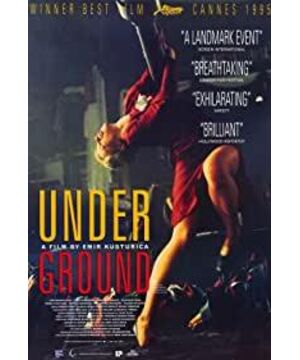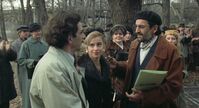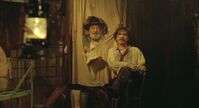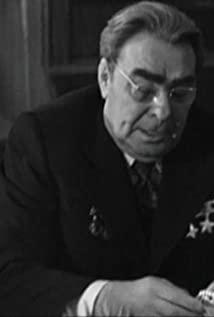poor health last week, and the computer and the Internet crashed for two days, and no one was able to repair it, so the blogging stopped. However, watching the disc continued, watching Rodriguez's "Sin City", Polanski's "Bitter Moon" and Kusturica's "Underground" in one go.
They are all old movies, and now they are of a make-up nature. After watching it, I once again increased my respect for the masters. Compared with them, the works of those "masters" in China are really called Pediatrics (it is also related to domestic films, damn...).
It's just that these films are too long, especially "Underground", which actually has 2 hours and 50 minutes, which takes a whole night. As a result, when I climbed into the bed, the hour hand had already pointed to one o'clock in the morning.
Catapult
before I thought of the film, does not like to know too many details, so do not know in advance which is actually a theater of the absurd. I have always believed that such a heavy subject, even if it is not made into a grand tragedy that shocks people’s hearts, it should at least be a serious drama with a little bit of sadness and no lack of humor like "Goodbye Lenin" (someone indeed combined the two films. Theory, but the facts have proved that Baker is still a little worse than Lao Ku).
Therefore, when the film started in a hilarious and joyful way, I was suddenly uncomfortable.
Moreover, I want to give up several times.
When the Germans bombarded Belgrade, one of our two protagonists grabbed the fat prostitute and asked her to continue her "work". After the prostitute escaped for his life, she simply fired a pistol by herself; the other was still there. After feasting, when the bomb overturned the dining table, he immediately left behind his pregnant wife, Gu Zi, and went to find a lover. In short, in the first 50 minutes of the film, I did not see any of their anti-fascist heroic feats. If so, it was just to snatch women from German officers.
Without the sorrow and rushing to the ground, without the enthusiasm and fighting spirit to fight against the enemy, Kusturica succeeded in subverting people's inherent impression of the invaded. The camera sweeps through the brutal streets of Belgrade, and no anger can be seen on the faces of every Yugoslav lady who passes by.
Seeing Kudo and Margo make a big fuss in the theater and snatching the part of Natalia's forcible wedding, I almost changed the disc. A farce, I thought to myself. Of course, comedy can be used to express sadness, such as Zhou Xingchi's "The King of Comedy", but it still does not escape the sad background. But at least until then, I still didn't see what Lao Ku wanted to say.
Seriously, if it weren't for Kusturica's name and the aura of the Palme d'Or at Cannes, I would not be able to continue this viewing journey.
Fortunately, I didn't do that, otherwise I would miss a great work.
It was this ridiculous wedding that inadvertently paved the way for Marko's 20-year lie. The kiss that Natalia gave him in order to escape, was like a stone dropped in a calm lake, causing ripples, and the aftermath was curled and twisted.
The wonderful story has just begun.
The
most heroic act in Malgge's life was to pretend to be a doctor and enter the Nazi hospital to rescue the brothers and sisters of Kudo and Natalia. After success, he couldn't restrain the ecstasy in his heart. He held his beloved woman and kissed wildly, even if a hole in the roof was blown out, he refused to let go.
It was an Allied bomb, and Yugoslavia was liberated.
At this time the film only played for an hour.
My curiosity was suspended: what will Lao Ku make for the remaining 1 hour and 50 minutes (that's the length of a normal movie)? What else can he take?
The master's wisdom was truly revealed at this time: he asked Malge, who was still on his feet, to keep his brother Kudo in the ground.
Marco embraced his brother's lover, enjoyed the love of the masses, unveiled Kudo's "portrait" in a remarkable way, and performed a good show of mourning for his dead friend on the set of the autobiographical film. Turning around, putting on his old clothes again, he went to the basement to encourage Kudo to continue the "fight". He made air-raid alarms and handed pocket watches in the name of Tito. The lifelike performances did not even forget the details of slowing down the time.
Kusturica used the story of genius to dispel the noble words of "hero" and "patriotism" into the invisible.
Reflecting on heroism in the same way, Eastwood continued the usual expressions in "The Banner of Fathers": confession, self-blame, pain, and nostalgia. The distress in the hero's heart is very understandable. He borrowed the protagonist's mouth to say "I am not a hero, the real heroes are dead". However, in the eyes of Lao Ku, people who are alive or "dead" are not considered heroes.
The so-called "hero" is nothing more than being shaped. This point was fully revealed in the in-play that reflected the "heroic deeds" of Margo and Kudo. That director, jumping up and down on the set, repeatedly asked the actors' performances to be true and true! But he didn't know that the most real but cruel performance was happening to "Hero Margo".
In a country without democracy, the ruler can use all means to portray a person as a hero or a traitor, and public opinion is nothing more than a tool to be manipulated. Unfortunately, few people can see through this, young people are still excited by "heroism."
What they longed for was actually the frozen posture of the hero before he died.
Another discount
is another wedding.
Kudo's son Yuna is 20 years old (because time has been slowed down, Kudo has always thought that he is only 15 years old) and is about to get married. The beautiful bride "destroyed in the air" (actually just being hung by a steel wire, but I really admire Lao Ku's imagination). For people who have not seen the sun in 20 years, this grand wedding is an inspiring festival.
But no one expected that Kudo was tired of the long wait. He hoped that he could bring him back to the ground on the day his son became an adult and "strike" the fascist invaders.
My heart hangs again: the moment the lie is exposed, how will Lao Ku end up?
It turned out that something went wrong. The orangutan accidentally stuffed the cannonball into the barrel, "boomed" twice, and the basement was blown into a huge gap. 20 years of dark life fell apart in an instant, and a brand new world appeared easily.
What kind of path will be placed in front of Kudo and Yuna?
Our wise old library, genius old library, waved a big hand: they set up their exit on the movie set, and they are hitting the scene of "Kudo's justice"!
Really Kudo saw his mortal enemy again: France! Ah, it turns out that the people of Yugoslavia are still under the iron hooves of fascism. You see, another revolutionary is about to be killed! He did not hesitate to take out his gun and collapsed his "enemy" (actually just an actor playing France. This scene reminds me of a true story: Back then, Chen Qiang played Huang Shiren in "White Haired Girl", and the result was An Eighth Route Army soldier watching the show was so excited that he pulled out his gun and was about to kill him. Reality and fiction are sometimes so similar!), the father and son drove on a rampage and bombardment on the set, they were so proud!
The lie has not been exposed, it is still going on.
If a person lives in a scam until death, then it is also a kind of happiness.
Like Kudo, like all the Yugoslavs under Tito.
The film has a subtitle full of deep meaning (in fact, the whole film is full of metaphors and deep meaning): After Marco disappeared, Tito lost support and died 20 years later. Just as Marco used lies to cover the people underground, Tito also used his power to cover the people of Yugoslavia.
After his death, the Socialist Federal Republic of Yugoslavia quickly fell apart and became a historical term. This country that once dedicated us famous films such as "Walter's Defence of Sarajevo" and "Bridge" has disappeared from the earth.
Three and a
half centuries have passed. Time has come to the 90s, and the film has come to an end.
Kudo has lost everything: his wife, son, daughter-in-law, brothers, lovers, friends in the band, and the motherland. He went back underground. It's just that the people who followed him changed from neighbors who escaped the Nazi invasion to the people who escaped the war in Bosnia and Herzegovina.
In the well, he saw that he had been searching for his son for 30 years, so he jumped down... It turned out that they were all there, and all the people he loved were there.
Reunion is finally possible.
If the film stops here, it is still a high-level masterpiece. However, Kusturica also added a wonderful ending, which allowed the film to rise to a great epic.
All the characters in the movie walked out of the water and re-hosted a truly grand wedding for Yuna. This was also Ku's wish for many years. People sang and danced and cheered, the riverbank was green with grass, cows and sheep were weaving, and even Marko and Natalia rose up to congratulate them. Seeing the unhappy expression on his wife’s face, Kudo said in a whisper: This is a friend’s wife, a friend’s wife... He and Malco took out rings and put them on the hands of their lovers. Everyone’s faces were full of happiness.
Natalia's disabled brother can throw off his wheelchair and dance, and Marko's brother Ivan, who stutters, can speak fluently. Turning his head, facing the audience, he said affectionately and clearly: "We have built new houses on this land with red roofs and doors open to guests. Storks also build nests here. We are here. We are grateful for the land that nourishes us, the sun that warms us, and the field that makes us miss our hometown. Will we still remember our motherland with sadness or joy? When we tell this story to our children and grandchildren, It will begin like all stories:'A long, long time ago, there was a country...' "
This terrific ending touched me deeply. Right now, when I re-transcribe this passage on my computer, I am still moved.
At the end of the suffocating tragedy, I did not see a trace of hatred and anger. There was no betrayal, no lies, only forgiveness, forgiveness, gratitude and the deepest love, to my lover, to the enemy, and to the motherland. These noble emotions made a great movie.
All the former Yugoslavs should watch this film and listen to Kusturica telling this absurd, true, and never-ending story:
a long, long time ago, there was a country called Yugoslavia...
end
It is very difficult to interpret "Underground". The whole film is full of profound metaphors: the never-old orangutan, the repeated songs of "Lily Marlene", the historical footage of Tito, the underground passage leading to neighboring countries, and the upside-down Jesus beside Marko when he died. Like, a small island floating off the mainland... Some people even analyzed that the image of Natalia represents the Yugoslav nation that is vacillating among various forces.
But limited by the lack of knowledge of Slavic national politics and history, forgive me for not being able to make a deeper and broader analysis of the film.
I still remember the shock when I first watched "One Hundred Years of Solitude" 15 years ago, and now "Underground" makes me relive this feeling. If Marquez used magic to write about the suffering of the Latin American nation, then Kusturica used absurdity to record the deep misfortune of the Slavic nation.
In the last paragraph of the book, Marquez wrote: "A family that is destined to be a lonely one hundred years will never have a second chance to appear in the world."
Now, the great old library, I put this sentence A word for you:
"A nation destined to be in the flames of war for 50 years will finally get a second chance to survive forever in the Lord of the Earth."
Original link:
http://www.mtime.com/my/304332/blog/423363 /
View more about Underground reviews









